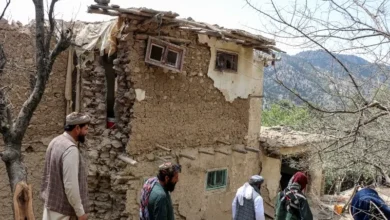Kashmir Marks Two Years Under Indian Military Siege & Violations
The acts of brutality haven't shattered the resolve of the Kashmiri people who vow to take freedom and say that the day only revives their enthusiasm

Today marks two years of the abrogation of Article 370 by the Indian parliament that revoked the statehood of Indian Occupied Jammu and Kashmir (IOJK).
The measure was taken to disturb the demographics of the Muslim majority region and millions of Kashmiris were deprived of fundamental rights.
Modi-led Indian government grossly violated United Nations (UN) resolutions and revoked the special status of IOJK by placing it under military siege enforced by around 700,000 military personnel.
Even after two years, life in the beleaguered region hasn’t returned to normal neither the Modi government has been able to placate the people under it.
Read Also
Pakistan Doing Utmost to Dispel Indian Influence on Afghan Issue
Indian Prime Minister Narendra Modi and Home Minister Amit Shah met with the Kashmiri politicians in June, it didn’t bode well.
The people who were put under a clampdown exactly two years ago are still far from basic facilities such as internet and cellular service and these services haven’t been restored completely yet.
Meanwhile, a number of Kashmiri political activists are still under detention for opposing the center’s move.
The pro-freedom jailed Hurriyat leader Muhammad Ashraf Sehrai died in May this year while his family was not allowed to attend the funeral and was informed only over the telephone.
The jailed veteran leader Syed Ali Shah Geelani is in a deterrioting health condition since 2019.
The prominent ones including Aasiya Andrabi, Muhammad Yasin Malik, Shabir Ahmed Shah, Advocate Shahid-ul-Islam, Altaf Ahmed Shah, Nayeem Ahmed Khan, Ayaz Akbar, Peer Saifullah, Raja Merajuddin Kalwal, and others are under house arrest or imprisoned.
In view of the possible protests today, the Indian government has beefed up the security in different parts of Kashmir and erected barricades.
More than 100,000 civilians have been killed by Indian troops during the past three decades while around 1,000 houses have been vandalized through staged operations.
Indian military force has been accused of gross human rights violations in the disputed territory and reports say over 11,000 women have been raped by the military men during the same span.
Around 2,500 women have also been gunned down by the Indian troops while over 100,000 Kashmiris suffer mental health issues.
Meanwhile, the perplexed Modi regime stopped five foreign journalists from visiting Pakistan to attend the session of the Pakistan-administered Kashmir Assembly today.
Information Minister Fawad Chaudhry and National Security Adviser (NSA) Moeed Yusuf shared the information with the nation.
These are actions of an insecure government that has much to hide and doesn’t want the world to see the reality of AJK and contrast it to the open jail that exists in IIOJK under Indian occupation. https://t.co/gmwvLCyt1D
— Moeed W. Yusuf (@YusufMoeed) August 4, 2021
Pakistani Prime Minister Imran Khan, also popular as the ambassador of Kashmir, has called for the global community to hold India accountable for its aggression in the disputed region.
Pakistan is also observing Youm-e-Istehsal today to express solidarity with Kashmiri brethren on the second anniversary of India’s unilateral illegal actions in the disputed territory.
The Indian acts of brutality have thus far proved counterproductive and haven’t shattered the resolve of the Kashmiri people who vow to take freedom and say that the day only revives their enthusiasm.



